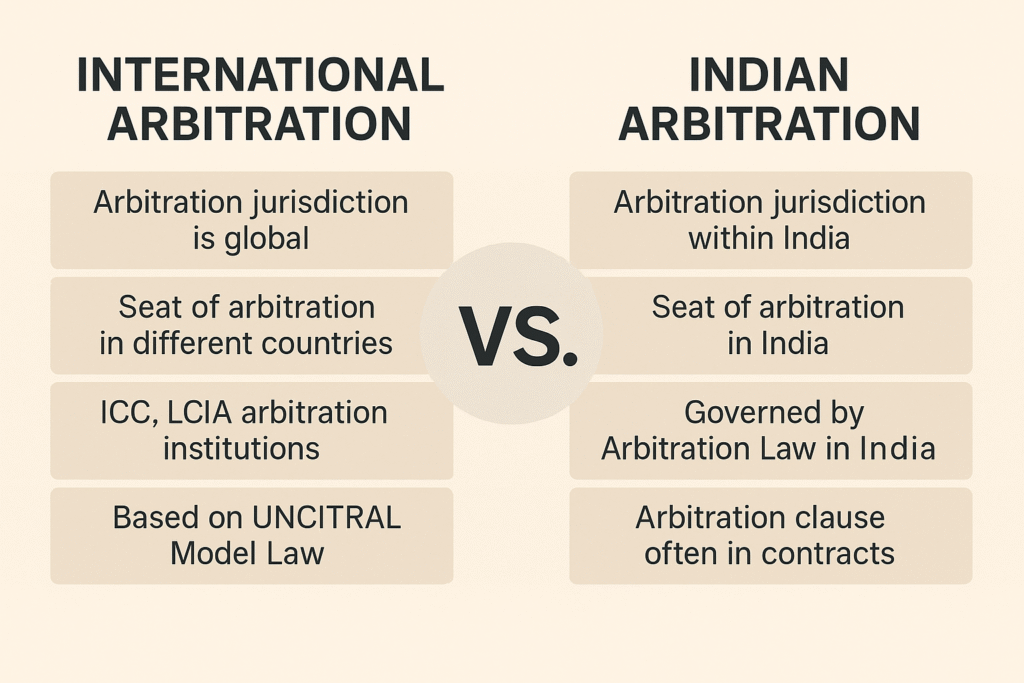The present era of globalized business demands that companies resolve their disputes efficiently for successful business operations. Arbitration between international and Indian contexts arises frequently within legal and business circles under conditions of cross-border deals between multinational entities. The article presents detailed information about the essential characteristics and implementation aspects of international vs. Indian arbitration to assist stakeholders in selecting their best dispute resolution method.
Understanding Arbitration
No matter the dispute, parties can select arbitration as their exclusive private forum outside regular court structures for conflict resolution. All arbitration clauses that govern disputes emerge from commercial agreements. Arbitration’s dispute resolution process delivers its disputes through quicker and more flexible proceedings that protect participants’ identities from disclosure. The approach gives all parties freedom to select their arbitrators and decide which law and procedural rules to follow.
The growth of international business activity has made international arbitration an optimal solution for overseas disputes, alongside the domestic importance of Indian arbitration as a resolution method for national contractual disagreements.
What is Indian Arbitration?
The Arbitration and Conciliation Act 1996, together with the Arbitration Law of India, establishes the framework for the Indian arbitration system, and it derives most of its provisions from the UNCITRAL Model Law. The Arbitration Law in India functions as legislation that covers both international vs. Indian arbitration procedures that occur in the national territory. The latest reforms of the arbitration system seek to enhance operational simplicity and institutional arbitration systems in a way that reduces judicial participation.
Key Features:
- The legislation adopts provisions from the UNCITRAL Model Law.
- The law of Arbitration controls its administration within Indian legal territory.
- The failure of parties to agree on arbitrators allows Indian courts to appoint suitable arbitrators for mediation.
- Emphasis on party autonomy and speedy dispute resolution
- The MCIA (Mumbai Centre for International Arbitration) establishes itself as an important institutional arbitration center while gaining wider support from users
What is International Arbitration?
International arbitration exists whenever natural or jurisdictional elements cross international borders, according to foreign party participation or origin from international commercial agreements. The interpretation of cases in international arbitration follows international rules commonly seen in ICC arbitration (International Chamber of Commerce) and LCIA arbitration (London Court of International Arbitration). The process takes place in a third-country location and includes arbitrators with different legal backgrounds.
Key Features:
- Involves parties from different countries
- Follows international norms and practices
- These agreements allow their seat to take place inside any country without any biases.
- The system bases its operations on standards recognized by all nations through the UNCITRAL Model Law.
- The New York Convention, among other treaties, enables high levels of enforcement power.
Key Differences: International Arbitration vs Indian Arbitration
The identification between International vs. Indian Arbitration arrangements becomes essential when multiple jurisdictions enter into business agreements.
Jurisdiction and Legal Framework
- The Indian court system, along with the Arbitration Law of India, conducts arbitration procedures in India.
- An international arbitration follows distinct legal systems by using the seat of arbitration to determine the jurisdiction where the process takes place.
Seat of Arbitration
The arbitration seat selection controls both the arbitration process regulations and the official court responsible for overseeing the process.
- The arbitration seat for India exists domestically, while Indian courts exercise authority over this process.
- International arbitration allows the seat to be located in Singapore or London, or any impartial location to enhance overall flexibility.
Arbitration Rules
- Indian arbitration happens either through ad hoc systems or institutional bodies, with the majority of operations based on Indian jurisdictional standards.
- International arbitration demands participants to utilize recognized sets of rules, such as ICC arbitration and LCIA arbitration, at their institutions.
Enforcement of Awards
- As a signatory state of the New York Convention, India gives domestic status to foreign arbitration awards for enforcement.
- Award enforcement becomes possible across worldwide jurisdictions when countries have approved the relevant conventions in which the award enforcement request originates.
Cost and Time
- The costs of Indian arbitration remain favorable, yet its speed suffers from the burdens faced by Indian legal institutions.
- The process of international arbitration may cost a lot, yet it delivers quicker and more efficient results.

Benefits of Indian Arbitration
- Familiarity with the Indian legal system
- The expenses of conducting arbitration at Indian institutions show lower rates than operating in global arbitration institutions.
- Easier access to local evidence and witnesses
- The arbitration jurisdiction operates clearly under Indian judicial authority
- Indian arbitration has gained judicial support during the past few years.
- Treatments between Indian parties benefit best from this method
- The Arbitration law in India contains extensive provisions that support its functions
Benefits of International Arbitration
- Generally, selecting a location outside of participating groupings will prevent biases linked to home-court advantages
- Businesses can adopt internationally standardized rules that exist within ICC arbitration or LCIA arbitration.
- Faster proceedings and enforceability in multiple jurisdictions
- When using the UNCITRAL Model Law, the process becomes more consistent.
- Expert arbitrators with cross-border commercial experience
- Suitable for complex international transactions
- Offers flexibility in procedural and substantive laws
The Role of Arbitration Clauses
The arbitration clause stands as an essential term included in commercial contracts. Such provisions set in advance the dispute resolution process, together with the arbitration location and rules of procedure. The successful draft of this clause requires absolute clarity from businesses to prevent potential complications.
Example:
All disagreements concerning this contract will be settled through arbitration administered by the institution while using its defined rules at the named location as the seat of arbitration. All arbitration proceedings will take place in the location specified here.
The clause specifies that disputes will be handled by either Indian or international arbitration and establishes which arbitration court will have jurisdiction over the matter.
Global commercial contracts depend heavily on properly written arbitration provisions to eliminate upcoming conflicts and time-consuming procedures.
The Importance of Arbitration Jurisdiction
The chosen arbitration jurisdiction decides how procedural law should operate while simultaneously controlling how arbitration awards get enforced as well as when courts can step in.
- Indian courts step in Indian arbitration proceedings for two reasons: interim relief requests or to assign arbitrators.
- Seating court jurisdictions take charge of procedural issues within international arbitration panels because such procedural measures tend to support arbitration needs.
The seat of arbitration selection can significantly affect the enforcement stability, along with procedural neutrality and transparency during arbitration proceedings.
ICC Arbitration vs LCIA Arbitration
ICCA and LCIA arbitration deliver organized framework-based systems that govern international arbitration proceedings.
ICC Arbitration:
- Known for global credibility
- Strong institutional support
- Suitable for high-value disputes
- Involves detailed procedural rules
LCIA Arbitration:
- Offers a more flexible and cost-effective structure
- Fast-track procedures
- Popular in Europe and the Middle East
- Efficient administration of proceedings
The institutions apply rules based on the UNCITRAL Model Law to follow internationally recognized practices.
Role of UNCITRAL Model Law
UNCITRAL Model Law provides a standardized legal framework that enables international arbitration laws to become harmonized worldwide. The central operational guidelines of global arbitration methods, as well as the arbitral laws in India, originate from the UNCITRAL Model Law.
- Ensures neutrality
- Minimizes judicial intervention
- Provides standardization in procedural laws
- The system fosters worldwide cooperation between parties involved in conflict resolution.
Any nation implementing the UNCITRAL Model Law demonstrates its dedication to friendly arbitration frameworks that facilitate international trade and foreign investment.
Real-World Application and Case Studies
A business agreement linking an Indian corporation with a U.S. tech company illustrates this scenario. A clause that contains Singapore as the arbitration seat location, together with ICC arbitration rules, guarantees both impartiality and worldwide enforcement capabilities.
Indian arbitration under the Arbitration law in India provides suitable services in cases where two Indian infrastructure companies need to resolve disputes because it ensures cost-effectiveness, combined with procedural knowledge.
Conclusion: Which is Better?
Different factors determine whether Indian arbitration suits professional needs better than international arbitration, including dispute type and geographical locations, as well as enforcement preferences and budget constraints, and faith in local legal frameworks.
The preferential use of Indian arbitration stands when all parties to the dispute are Indian organizations and expense matters most.
International arbitration suits businesses operating with foreign entities or high-value disputes, as well as situations demanding international enforceability.
Understanding the arbitration mechanisms requires knowledge of both their benefits and learning about legal frameworks and clauses, as well as jurisdictions and seats, which will guide the right decision-making. Businesses that understand ICC and LCIA arbitration institutions and understand the UNCITRAL Model Law can use this expertise to author effective dispute resolution clauses.
A fair, enforceable, and efficient dispute resolution remains the main objective for both International vs. Indian Arbitration procedures.
FAQs for International vs Indian arbitration
- 1. What is the difference between International arbitration vs Indian arbitration?
International arbitration vs Indian arbitration differs mainly in jurisdiction, applicable laws, and enforcement. International arbitration is governed by global rules like the UNCITRAL Model Law, while Indian arbitration follows the Arbitration Law in India.
- 2. What are the benefits of choosing International arbitration?
International arbitration offers neutrality, global enforceability, and flexibility. Institutions like ICC arbitration and LCIA arbitration provide robust procedural frameworks and experienced arbitrators.
- 3. Is Indian arbitration enforceable globally?
Indian arbitration awards can be enforceable internationally under the New York Convention, but the seat of arbitration, local laws, and arbitration jurisdiction play a key role in recognition and enforcement.
- 4. What is an arbitration clause and why is it important?
An arbitration clause is a contract provision where parties agree to resolve disputes through arbitration. It defines the seat of arbitration, language, and rules, and is crucial in both International arbitration and Indian arbitration.
- 5. How does the UNCITRAL Model Law impact arbitration?
The UNCITRAL Model Law serves as a guideline for modern arbitration law in India and internationally. It ensures consistency in arbitration jurisdiction, procedure, and recognition of awards across borders.




There is noticeably a bundle to know about this. I assume you made certain nice points in features also.
Pingback: Alternative Dispute Resolution and Court Efficiency in India
Super-Duper site! I am loving it!! Will be back later to read some more. I am bookmarking your feeds also.